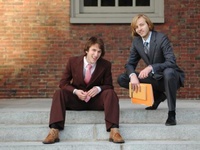When a frazzled-looking girl opens her door to face Undergraduate Council (UC) presidential hopeful Ryan A. Petersen ’08, he excuses himself: “You look stressed. Should I come back another time?”
The girl explains that she has a Social Analysis 10, “Introduction to Economics,” midterm the next day, and he offers her a one-minute version of his much-practiced talk. As he speaks, Petersen leans against the door frame, one leg crossed over the other, casual, confident, yet unimposing.
“Ec 10 is a TF-heavy class, right?” Petersen asks.
The girl smiles and nods wryly, relaxing as Petersen segues to one of his main platform points: improving the quality of instruction from teaching fellows.
Behind the shaggy-haired, easy-going candidate, an efficient staff of 270—including a majority of the UC—runs his elaborate campaign, freeing Petersen and his running mate Matthew L. Sundquist ’09 to schmooze with the voting masses.
FACE TIME
Campaign Manager Tracy E. Nowski ’07 heads the well-oiled campaign staff that frees the candidates for face time.
She says that almost everyone on the UC, except those running for office, is behind the Petersen-Sundquist campaign.
“We’re here supporting Ryan and putting in place all the mechanisms for Ryan and Matt to meet as many people as possible and get the word out,” Nowski says.
Every morning during campaign week, Nowski holds staff meetings at 8 or 9 a.m. to discuss the day’s game plan. A flow chart delineates 30 titled positions within the campaign staff. House officers coordinate campaigning in each House, while Michael R. Ragalie ’09 organizes student groups campaigning and Petersen’s schedule for the week. In fact, Petersen says he sometimes doesn’t know where he’s going until Ragalie tells him.
“It’s a humbling experience having all these people on your campaign,” says Petersen. “I’ve never had a campaign staff ever in my entire life. That’s one thing that’s different about campaigning for UC president—if you don’t have a campaign staff then you don’t have a chance.”
Petersen and his running mate are long-time UC members with experience working on and winning campaigns.
Both candidates have served on the UC since they were freshmen. Petersen chairs the Student Affairs Committee (SAC)—the student advocacy branch of the UC—while Sundquist is vice chair for College Life on SAC. They have advocated for initiatives like extending Lamont Library hours, constructing the Lamont Café, overhauling the Core Curriculum, and instituting universal key card access for freshman dorms.
Four of the last six UC presidents have been chairs of SAC, setting a strong precedent for Petersen’s campaign.
Regardless of their insider status, Petersen and Sundquist bill themselves as men of the people.
“We’re all about the grassroots,” says Sundquist.
THE GAME PLAN
Among the 56 different platform points listed on their Web site’s “game plan,” a reformed academic calendar and an e-mail address where students can anonymously report bad teaching fellows have been the most frequently touted throughout the campaign.
Dean of the College Benedict H. Gross ’71 has said that calendar reform will most likely wait until after the completion of the General Education reforms, calling into question the feasibility of the implementation of one of Petersen’s main platform points.
But Petersen, who has served on eight advocacy groups, says that the UC’s power lies in advocacy, rather than implementation.
“The UC can’t actually do anything. Getting the faculty members to care about [the issues] is how we can affect change,” he says.
Despite their numerous platform ideas, Petersen and Sundquist say they can tackle everything on their list.
“I don’t think anyone can realistically promise success on every issue. But I do think we can make progress on every single point in our platform,” Petersen says.
Sundquist says certain proposals, like TF@harvard.edu, can be implemented in as little as a month and says he and Petersen will develop a schedule for implementing their other proposals.
Understanding how UC advocacy works is an advantage Petersen says he has over fellow presidential hopeful Tom D. Hadfield ’08.
“Hadfield would find it very, very difficult to achieve his goals without sidelining the more important UC advocacy projects,” he says.
In contrast, Petersen and Sundquist say they’ve set more realistic goals because they know how the UC functions.
FRIENDS BEFORE POLITICS
The pair’s friendship extends beyond the political arena. They first met last fall when Sundquist was elected onto the UC as a freshman, and the duo travelled down south on a road trip last spring break.
Sundquist says their collaboration is “not merely a political union, but one of mutual respect.”
“I just realized that I’d rather work with someone who’s competent, who I’ve worked with well in the past, and whom I’m friends with, rather than someone who balanced me politically,” Petersen said. “I could have picked someone from outside of the UC. Or not another shaggy-haired white male.”
And the friendship seems to have strengthened throughout their campaign.
“We’re spending a lot of time together. You really get to know a person well when you’re working with him 24-7 for three weeks,” Peterson says. “I love him more every day.”
IN THEIR OWN WORDS: Click here for the Petersen-Sundquist campaign video on HRTV.
Multimedia
Read more in News
Religion














